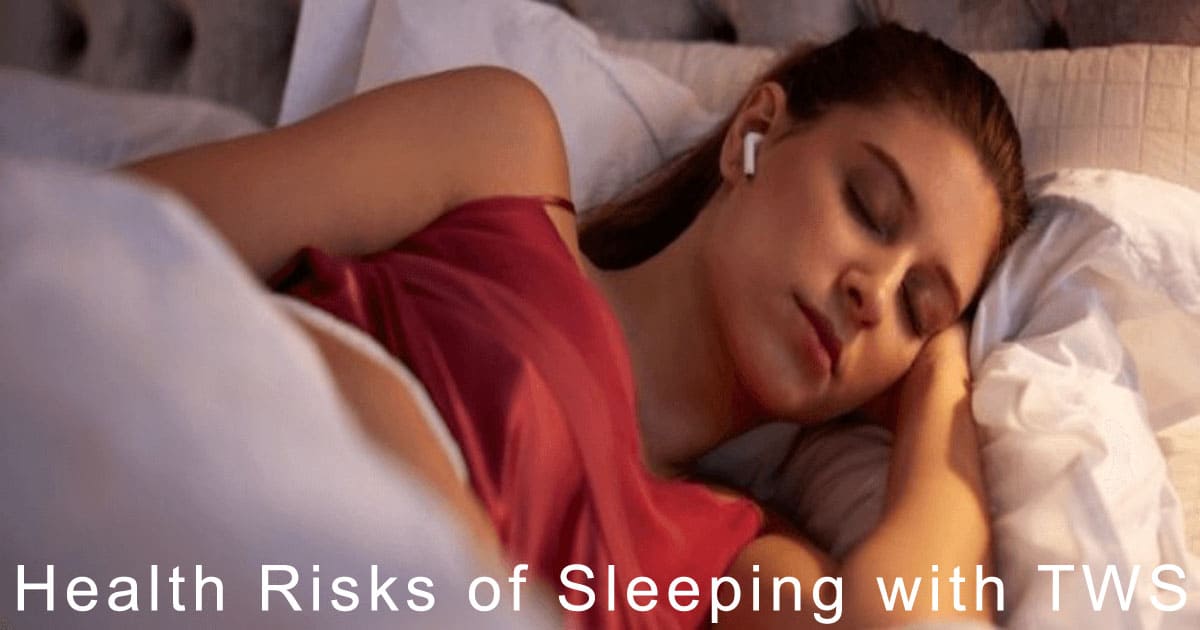Health Risks of Sleeping with TWS – Who doesn’t love falling asleep to their favorite music or podcast? Many of us feel more comfortable sleeping with TWS (True Wireless Stereo) earbuds in our ears. However, this habit can actually pose health risks, especially if done frequently. https://wearegntlmen.com
TWS earbuds are super popular these days. Almost everyone uses them for listening to music, chatting, or even sleeping. But while they’re convenient, there are several health risks you should understand so you can make smarter decisions going forward.
Health Risks of Sleeping with TWS:
1. Hearing Issues and Ear Damage
TWS might look small and comfy, but did you know these little devices can actually cause some serious problems for your ears? One of the biggest issues is the volume. Many people tend to listen to their music at full blast while falling asleep, often without realizing how damaging it can be.
Why is this dangerous?
According to research from the National Institute for Occupational Safety and Health (NIOSH), sounds louder than 85 dB can damage the hair cells in your ears. If this happens repeatedly, it could lead to permanent hearing loss. Since TWS are placed so close to the eardrum, the risk of damage is higher compared to regular headphones.
Tip: If you use TWS to sleep, make sure the volume is no higher than 50% of the maximum. You can also set a timer in your music app to automatically lower the volume after a certain period.
2. Ear Infections and Irritation
Furthermore, using TWS for an extended period of time increases your chance of developing ear infections and skin irritation. Moisture and perspiration can become lodged in your ears, providing the ideal conditions for the growth of germs and fungi.
Plus, wearing earbuds for too long can cause physical irritation to the skin in your ears due to repeated friction. TWS can also block the ear canal, disrupting airflow and leading to swelling or infections.
Tip: Clean your TWS regularly and give your ears a break by not wearing them all night long.
3. Disrupted Sleep and Poor Sleep Quality
Many people use TWS to help them sleep, whether it’s with soothing music or white noise. However, this habit can actually disrupt your sleep quality. Research has shown that listening to sounds (especially loud or stimulating ones) during sleep can affect your sleep cycles.
Even though you might be asleep, your brain could still be active due to the audio stimulation, leading to shallow sleep and a lack of restorative rest.
Tip: If you want to sleep with sound, consider using an external speaker or sound system. Go for softer sounds that don’t disrupt your sleep.
4. Electromagnetic Radiation from TWS
Any electronic device that connects via Bluetooth, like TWS, emits electromagnetic waves, even if the levels are really low. While there’s no solid evidence yet to prove that radiation from TWS can cause significant harm, some studies suggest long-term exposure to electromagnetic radiation might affect our cells, including brain cells.
Tip: If you’re concerned about radiation, choose TWS with low-energy Bluetooth features or use earbuds that aren’t always connected while you sleep.
5. Psychological Dependence on TWS for Sleep
Sleeping with TWS can result in psychological dependence. If you get used to falling asleep while listening to certain sounds or music, you might find it difficult to sleep without your earbuds. This can become a problem if your TWS breaks or if you’re in a place where you can’t use them.
Tip: Try practicing sleeping without TWS occasionally and opt for natural sounds, like a fan or ambient nature noises, to reduce dependency.
Ways to Preserve Healthy Ears and Improve Sleep Quality
Even though sleeping with TWS might feel comfortable, it’s important to be aware of the risks to both your ear health and sleep quality. The following actions can help safeguard your health:
- Use TWS Wisely: Keep the volume low, and don’t listen at high levels for long periods. Use a timer in your music app to limit the time you spend listening.
- Clean Your TWS Regularly: Make sure to clean your TWS often, especially after wearing them while sleeping. This helps reduce the risk of ear infections.
- Consider Alternatives for Better Sleep: If you need sound to fall asleep, use a speaker or sound system instead of earphones. This is safer for your ears and won’t interfere with your sleep.
- Give Your Ears a Break: Don’t make it a habit to wear TWS every night. Let your ears rest and avoid the risk of constant exposure.
- Watch for Signs of Health Issues: If you notice discomfort in your ears or a drop in your sleep quality, consult with a doctor or ENT specialist.
Conclusion: Protect Your Ears While Sleeping with TWS
While sleeping with TWS might feel convenient, there are several health risks to consider. You should use earphones cautiously to avoid problems like poor sleep, ear infections, and hearing problems. By using TWS wisely, keeping them clean, and giving your ears a break, you can continue to enjoy their benefits without compromising your long-term health.
If you find it difficult to sleep without TWS, try switching to a speaker or a more ear-friendly option. Your ear health and sleep quality are too important to risk for the sake of convenience.



